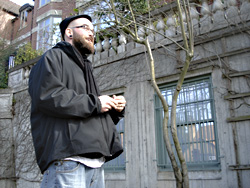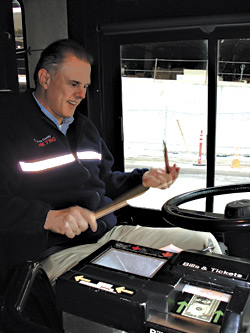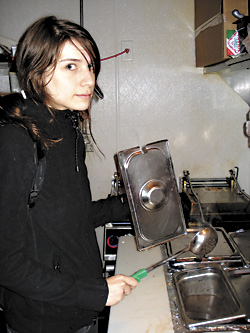Most people know RA (real name: Ryan Abeo) as half of the hip-hop group Common Market. But in one condo building on Capitol Hill, he’s known as the maintenance guy.
Once a resident paid RA $200 to wash his car. That’s not part of RA’s job description. But he never questioned the request.
“The list of homeowners here reads like a ‘Who’s Who’ of the Seattle elite,” he says. “The position that I’m in now is one that requires me to bend the rules without really breaking them. If they ask me for a favor, I’m happy to do it.”
So when a homeowner asked RA to dog-sit, he agreed.
“So I guess it was probably day three or day four—I take this dog with me to and from work, I don’t just leave it at the house—I mean I’m guarding this dog with my life, it’s that important to me, right? I take the dog for a walk and because he’s familiar with the area and usually walks off a leash, I didn’t put him on a leash. So we head out the back door and we get about a half-block down the block and the dog sees a cat. And he just bolts after the cat. Not a big deal, I figure the cat was probably agile enough to get away from this dog. But that didn’t happen. The dog caught this cat by the back of the neck. And I’ve never seen a black lab act this way, but he started shaking that thing so violently that I just knew the dog had broken the cat’s neck. I ran down the block, started beating the dog over the head to drop the cat. When he did—the cat just lay there. It really did look dead. I took the dog back, locked him in the office, I ran back to find the cat and it was gone.”
But RA never told the owner of the dog what had happened.
“It’s kind of like when you’re baby-sitting kids and the parents come home and they’re like ‘Well, how did they behave?’ And you’re like, ‘Oh, they were angels,’ y’know, when really they were terrible kids the whole time, but you don’t want to tell the parents that, right?”
In Common Market’s forthcoming EP, Black Patch War, RA raps about his family’s history in the tobacco fields of Kentucky. He speaks of class struggle and armed revolt. But in his small concrete office, stocked with cleaning supplies and abandoned furniture, he describes the wealthy condo owners with affection, even reverence. RA says physical labor helps him maintain that humility. It also inspires his music.
“Whether I’m walking around collecting trash and taking out recycling, or whether I’m cutting grass or pruning trees or whatever it is that I do here,” says RA, “I’m concentrating or focusing on music. And I might get a couple of lines that come to me, and whenever I get a chance to break, I’ll come down to the office and write them down. So a lot of pieces actually get composed that way. There are times when I finish a piece, and the piece of paper is just filthy. It’s covered with dirt and mud. And I think that’s very symbolic in a way.”
Joshua McNichols
Day Job is a look at how musicians pay the rent.








